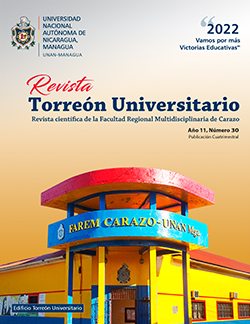Contextual transposition: Didactic strategy for the writing of the argumentative essay
DOI:
https://doi.org/10.5377/rtu.v11i30.13380Keywords:
Argumentation, sociocultural approach, central idea, written production, dialogic text, contextual transpositionAbstract
The objective of this educational research was to assess the impact of the didactic strategy "contextual transposition" in the writing of argumentative essays. This strategy is located in the sociocultural approach of textual production and emerges as an innovation in the diagnostic stage of this research. Four phases were defined for its application: a) sensitization, b) exploration and discussion, c) transposition and, d) evaluation. This is participatory action research, which was applied to tenth grade “A” students of the Benito Salinas de Dolores-Carazo Institute in Nicaragua, during the second semester of 2020. The research instruments were the diagnostic test, the didactic unit, the final test, the evaluation rubric of the essay written by the students, and the field journal. The main results are that from the contextual transposition, the students improved the written production, the definition of the thesis, and the organization of the ideas and structure of the essay, however, its impact on the reproduction of the sociocultural context or image of The reality of the student at the dialogic text level is limited, therefore, more studies must be carried out to understand and overcome the limitations.
Downloads
967
HTML (Español (España)) 469
VISOR (Español (España)) 0
PDF 164
HTML 198
References
Aguilar, S. & Barroso, J. (2015). La triangulación de datos como estrategia en investigación educativa. Revista de medios y educación. N° 47, pp. 73-88. ISSN: 1133-8482.
Camargo M. Zahyra, Caro L. Miguel Á. & Uribe Á. Graciela. (2012). Estrategias para la comprensión y producción de textos argumentativos. Shopia, (8), pp. 120136.
Cárdenas Rojas, D. (2007). Breve guía de estilo para la redacción científica. Lima.
Castelló, M., Bañales, G. &Vega, N. (2010). Enfoques en la investigación de la regulación de la escritura académica: Estado de la cuestión. Electronic Journal of Research in Educational Psycology, 8 (3), pp. 1253-1282.
Colmenares, A. (2012). Investigación acción participativa: una metodología integradora del conocimiento y la acción. Voces y silencia: revista latinoamericana de educación. Vol. 3 (1), 102-115. ISSN: 2215-8421
Lezama, M. & Herrera, R. (2016). Estrategias de Enseñanza para el abordaje de la redacción de textos argumentativos en séptimo grado (tesis de grado para optar al título de licenciatura en Lengua y Literatura Hispánica, no publicada). Universidad Nacional Autónoma de Nicaragua, Managua (UNAN-Managua). Repositorio institucional.
Hernández Sampieri, R., Fernández Collado, C. & Pilar Baptista, M. (2014). Metodología de la investigación (sexta edición). USA: McGRAW-HILL. Ministerio de Salud. 2da edición.
Montoya Rios, A.M. & Motato Mejía, J.J. (2013). Secuencia didáctica para la producción de textos argumentativos (ensayo), en estudiantes de grado once de la institución educativa INEM Felipe Pérez de Pereira. (Tesis inédita de grado para optar al título de Licenciado en español y literatura). Universidad Tecnológica de Pereira. Colombia.
Torres, I. (2004). Una mirada pedagógica a la escritura de un ensayo argumentativo. Revista de Estudios Sociales, (19), pp. 97-105.
Published
How to Cite
Issue
Section
License
Copyright (c) 2022 National Autonomous University of Nicaragua, Managua (UNAN-Managua).

This work is licensed under a Creative Commons Attribution-NonCommercial-NoDerivatives 4.0 International License.
Los autores que publican en esta revista están de acuerdo con los siguientes términos.
- El autor o los autores de los artículos, ensayos o investigaciones conceden a la Universidad Nacional Autónoma de Nicaragua, Managua (UNAN-Managua) los derechos de edición (copyright) del trabajo enviado, por consiguiente la Universidad cuenta con el derecho exclusivo para publicar el artículo durante el periodo completo de los derechos de autor.
- Estos derechos de autor/ autores autorizan a la Revista Torreón Universitario y a la Universidad editar y divulgar/publicar el artículo en dicha Revista, incluyendo reproducción impresa y electrónica, el almacenamiento, recuperación y cualquier otro tipo de publicación, y fuentes de información secundaria como servicios de resúmenes y bases de datos, así mismo la facultan a proteger el artículo contra el uso no autorizado para su difusión por medios impresos o electrónicos (PDF, HTML, EPUB, XML u otros).
Licencia para el uso del contenido
La revista hace uso de la Licencia Creative Commons Atribución-NoComercial-SinDerivar 4.0 Internacional.
Bajo esta declaración:

Este revista está sujeta a una licencia de Creative Commons Reconocimiento-NoComercial-SinObraDerivada 4.0 Internacional. Puede ser copiada, distribuida y transmitida públicamente siempre y cuando se cite al autor y la fuente (Revista Torreón Universitario), no debe modificarse ni utilizarse con ningún fin comercial. La licencia completa se puede consultar en http://creativecommons.org/licenses/by-nc-nd/4.0/.



